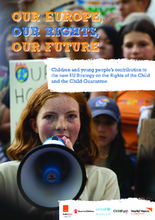The perspectives and priorities of more than 10,000 children and young people, from within and outside the European Union (EU), are expressed powerfully throughout this report. While each child’s life is unique, together the children provide a coherent and insistent set of messages that speak to being a child in 2020. They testify, yet again, to the imperative of listening to what children say and building economic, social, legal and policy frameworks that place the realization of their human rights at the centre of the work of the EU. Many common and urgent themes emerge: a third of the children and young people have experienced discrimination or exclusion; many are denied access to vital services; the education system is failing to meet the aspirations and expectations of too many children; high levels of violence continue in children’s lives; and there is still a failure to listen to, respect and take into account children’s views. And in all areas, children from the most marginalized groups face the gravest challenges.
Perhaps the most pressing finding, however, is that a fifth of children in the EU are growing up unhappy and anxious for the future. The causes are many and complex, but they are clearly linked to the lack of respect for and protection of children’s rights. They highlight with great force that we are failing to create environments for optimum childhoods for far too many children. It is a clarion call for action. The findings do not provide all the answers, but they highlight the questions that point in the right direction, and that journey must be taken in partnership with children. Not only do children have a right to be heard, but their expertise and experience are a vital dimension in working towards a future in which their rights are respected. This report offers critical evidence to inform the EU policy agenda. It needs to be heard and acted on in both the EU Strategy on the Rights of the Child and the Child Guarantee.

